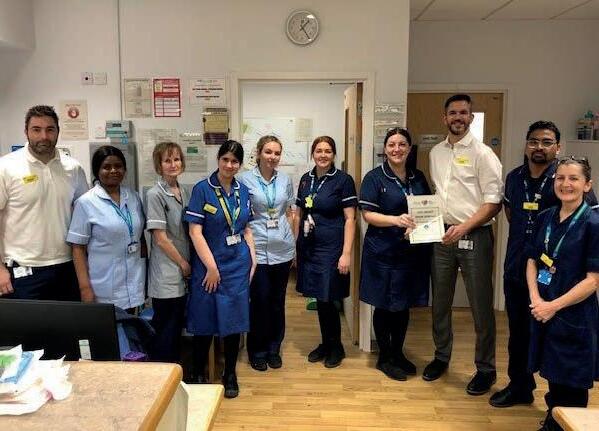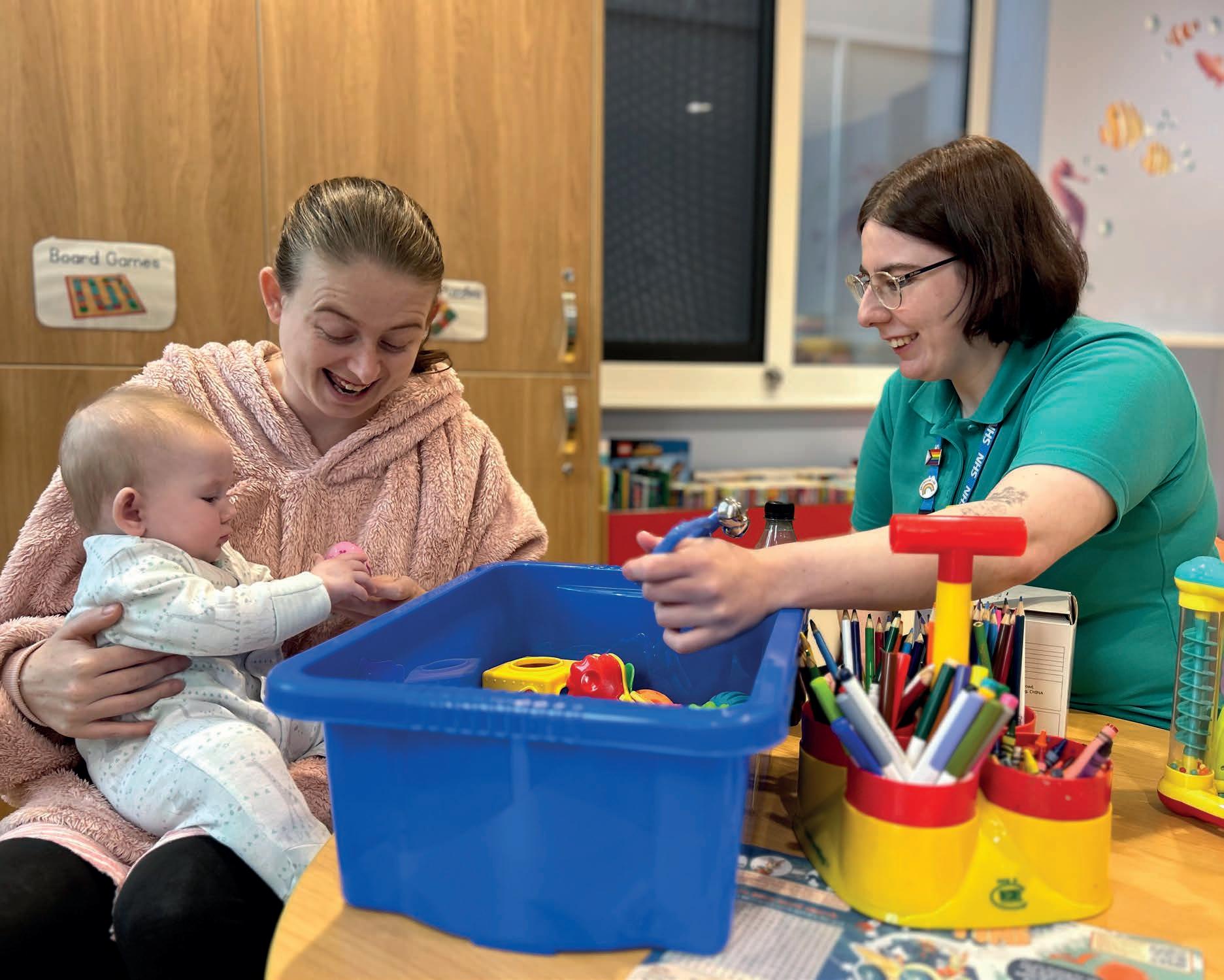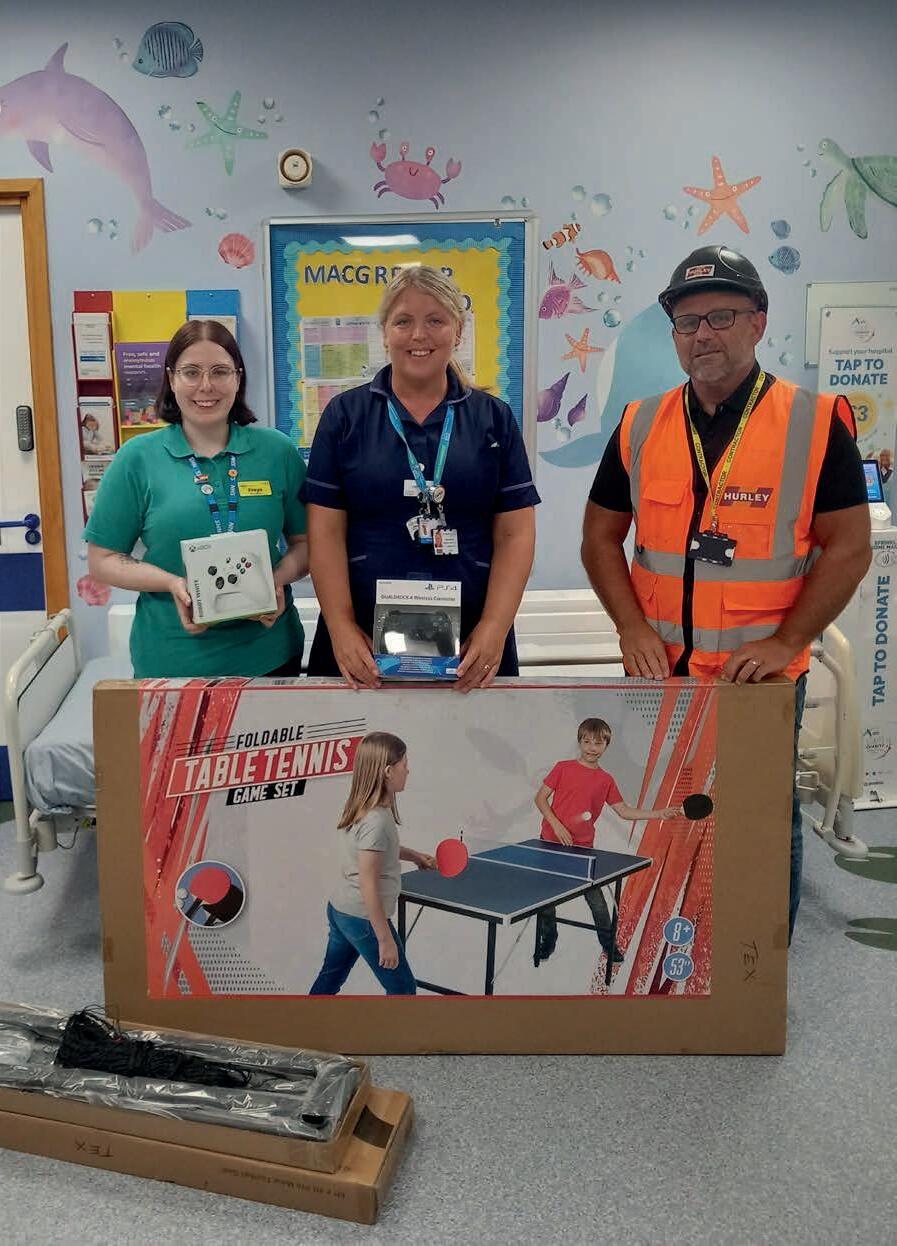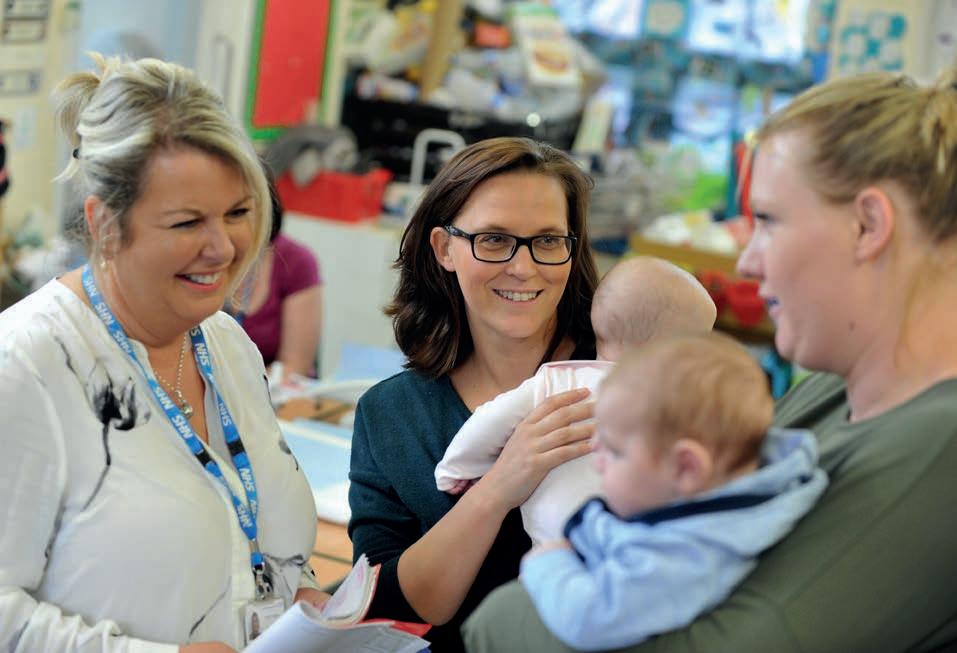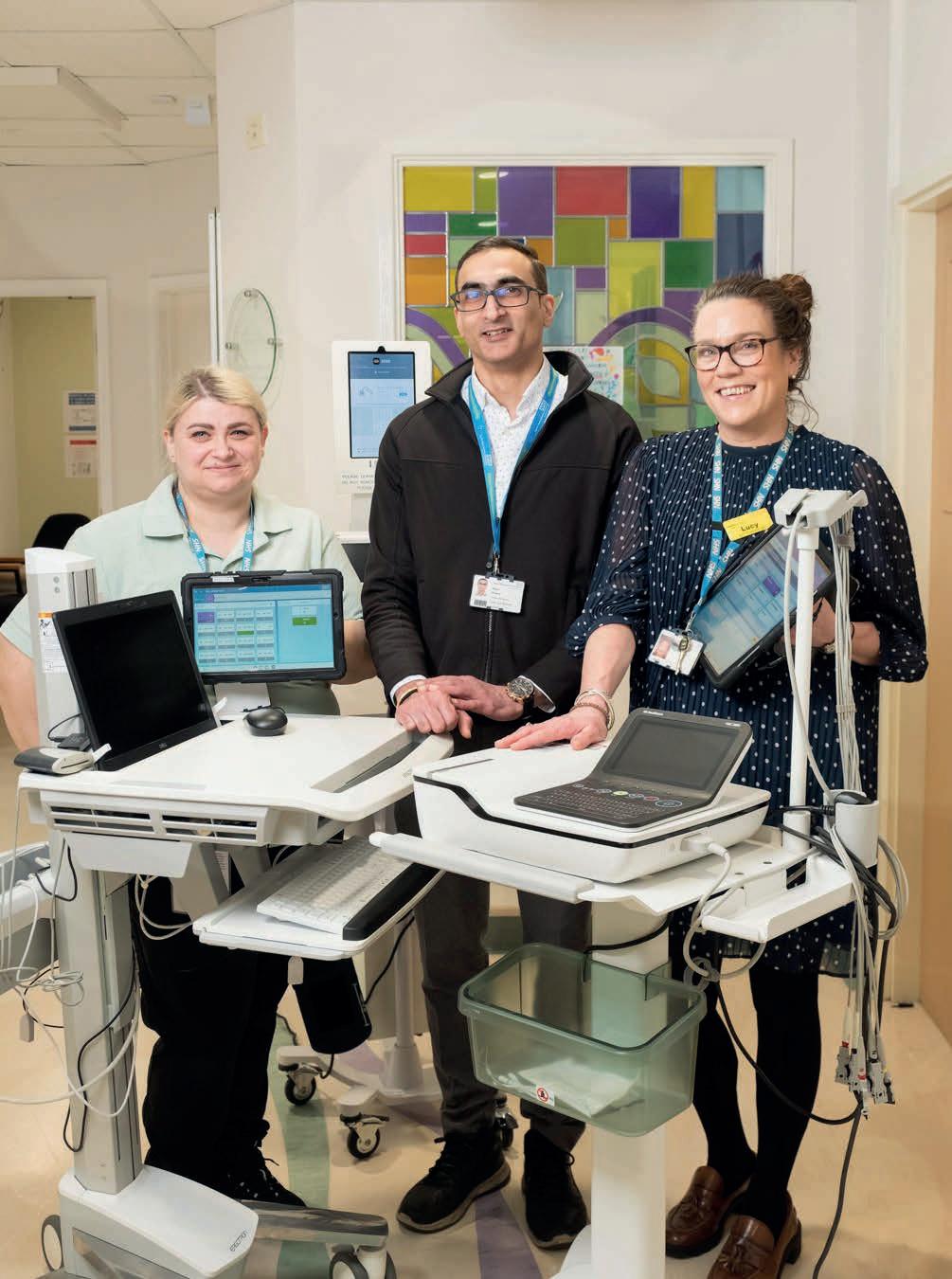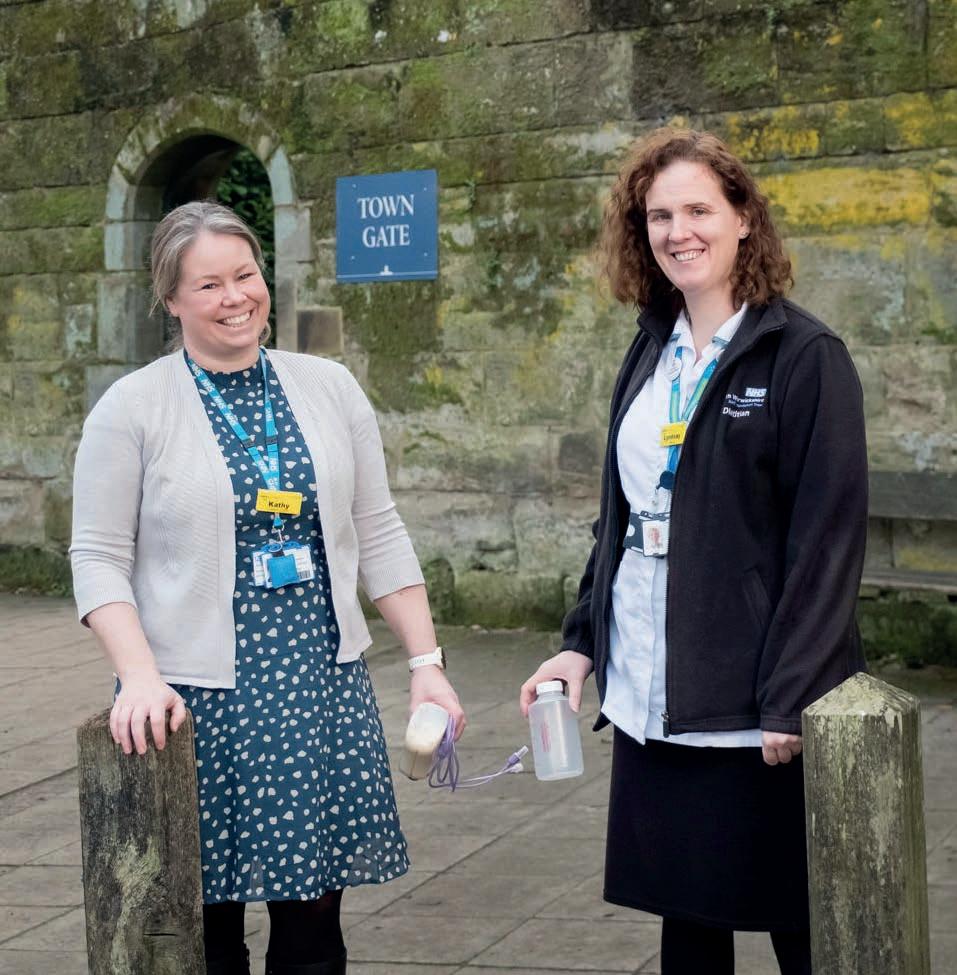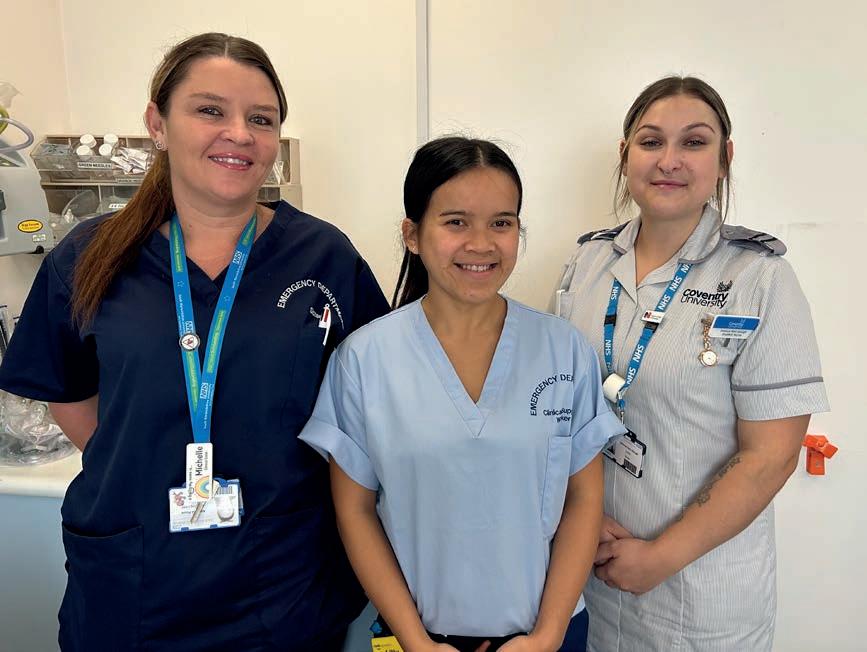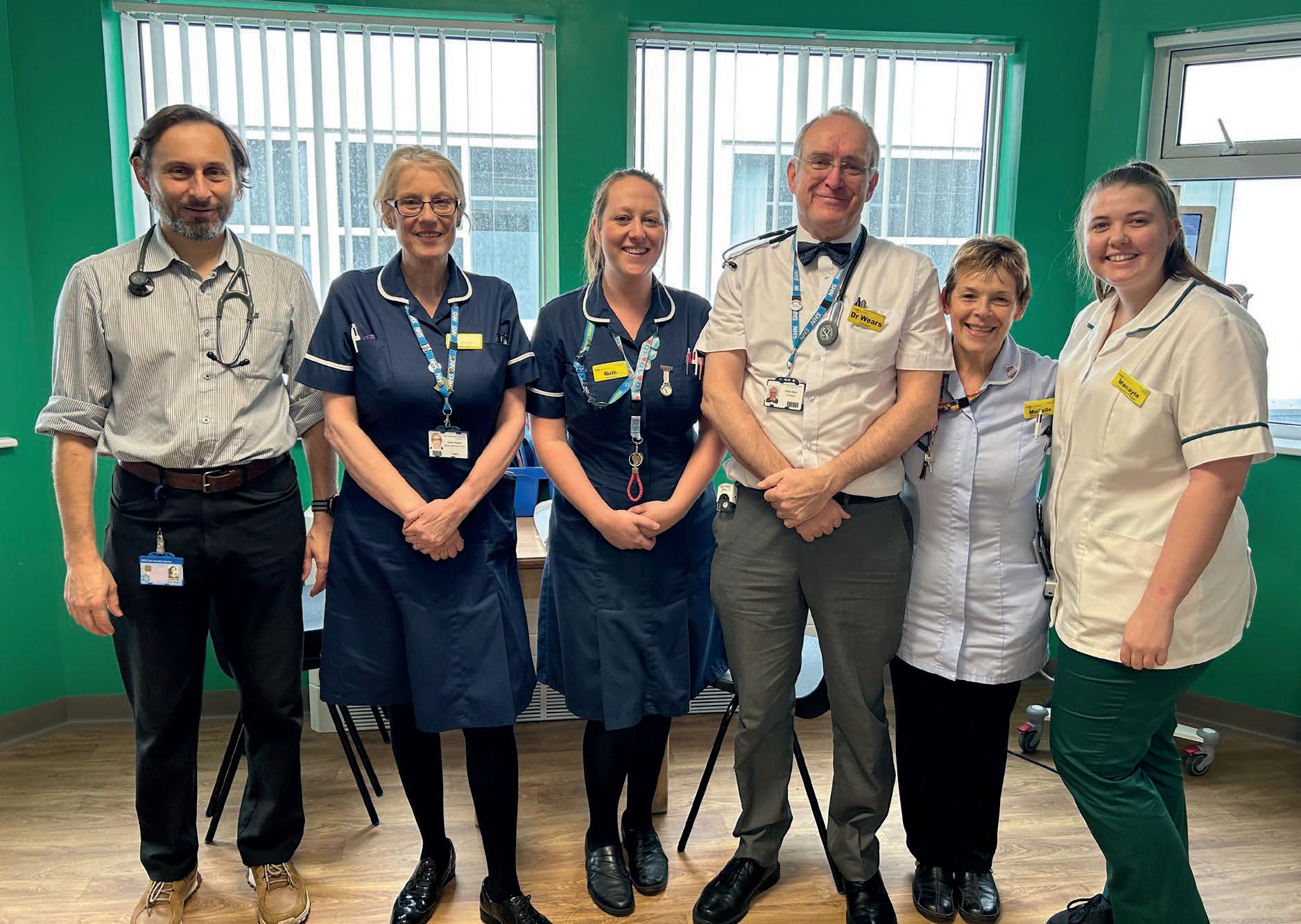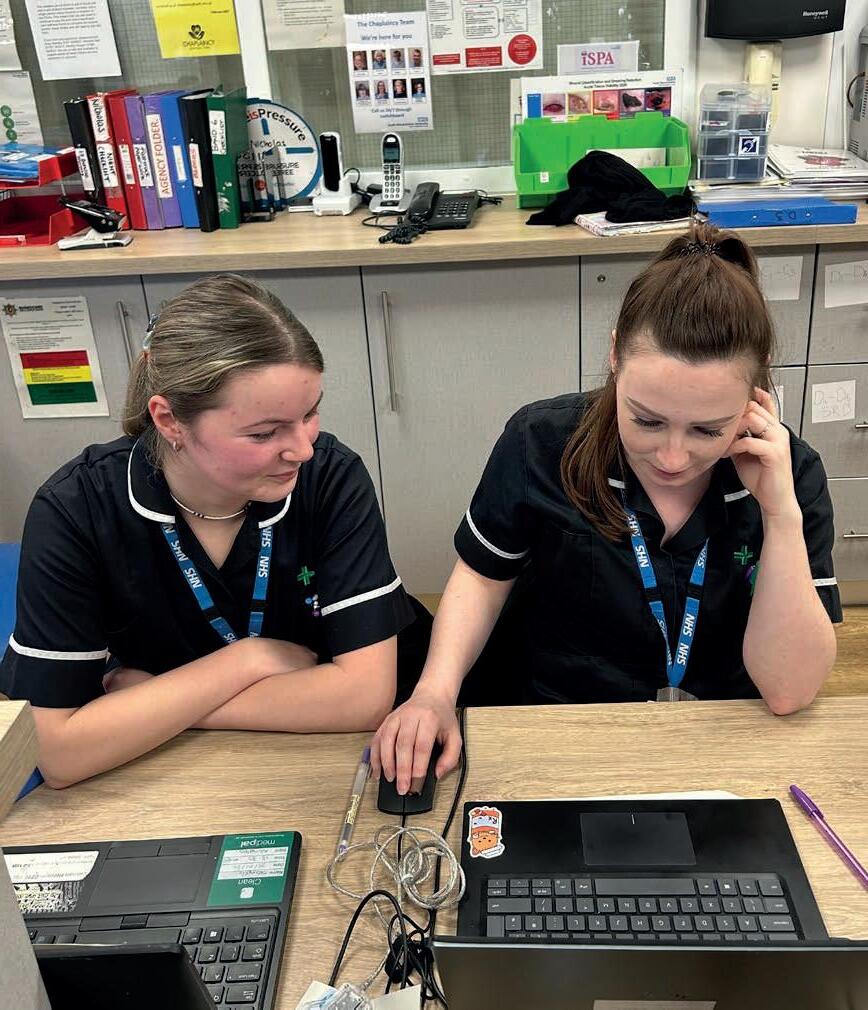2. An Introduction to South Warwickshire University NHS Foundation Trust and its role in Breaking Down Barriers
2.1. A Background to South Warwickshire University NHS Foundation Trust
South Warwickshire University NHS Foundation Trust (SWFT) provides healthcare services to around half a million people in Warwickshire, with additional young people’s and family services also delivered across Coventry and Solihull.
Its work spans four hospitals: Ellen Badger, Leamington, Stratford and Warwick Hospital, out of hospital services, a dedicated charity and two business subsidiaries, SWFT Clinical Services and Innovate Healthcare Services.
The Trusts vision is: “Helping people to live healthier, happier lives..”
To do this, its 5,100+ staff are united through a set of key values built around five pillars:
Safe – “we put safety above everything”
Effective – “we will do the right thing at the right time”
Compassionate – “we offer compassionate care to everyone”
Trusted – “we will be open and honest”
Inclusive ‘we accept and value everyone’
As noted in its latest annual report, the Trust’s strategy is focused on health, rather than illness, with an emphasis on “helping you to help yourself”. This strategy is delivered by an engaged and passionate workforce and key partnerships which support its vision.
Its strategy is also aligned to the national 10 Year Health Plan, which is focused on the three shifts that the government, health service, and experts agree need to happen.
This includes:
• moving care from hospitals to communities
• making better use of technology
• focussing on preventing sickness, not just treating it
It is also closely aligned to the Neighbourhood health guidelines, and the ambition to move to a health service which will create healthier communities, helping people of all ages live healthy, active and independent lives for as long as possible, while improving their experience of health and social care, and increasing their agency in managing their own care.
2.2. South Warwickshire University NHS Foundation Trust’s Purpose
SWFT is dedicated to breaking down barriers to opportunity, guided by its core values of being Safe, Effective, Compassionate, Trusted, and Inclusive.
SWFT’s approach centres on fostering an environment where communication, teamwork, empathy, respect, and diversity are paramount. Through embracing these principles, the Trust aims to empower both its staff and the communities it serves, creating a foundation for accessible, equitable healthcare.
In recent years, the NHS has undergone significant changes, driven by the response to COVID-19, rising demand for services, and a strengthened focus on partnership across health and social care. To address this evolving landscape, SWFT has refreshed its strategic vision, setting out ambitious plans that incorporate insights from staff, partners, and the public.
This inclusive process highlighted key priorities, challenges, and areas of opportunity, which have been distilled into four strategic moves that define the Trust’s mission:
1. Be a Very Flexible Employer – SWFT is committed to supporting its workforce through flexible employment practices that enhance work-life balance and promote job satisfaction.
2. Lead the NHS in Carbon Reduction – The Trust seeks to drive sustainable healthcare by reducing its carbon footprint and promoting eco-friendly practices across its operations.
3. Embed Prevention in Every Service – Prevention is at the heart of SWFT’s approach, with a focus on proactively addressing health issues to improve long-term outcomes for patients and communities.
4. Home First, Supported by Technology and Collaboration – SWFT prioritises a “Home First” approach, ensuring that patients receive care in the comfort of their homes whenever possible, with the support of technology and close collaboration across health and social care.
Through these initiatives, SWFT aims to create an accessible, supportive, and responsive healthcare environment that breaks down barriers to opportunity and delivers quality care for all.
2.3. Breaking Down Britain’s Healthcare Barriers
The Purpose Coalition measures organisations against a set of sector-relevant social impact criteria. The Purpose Goals outline 15 interconnected impact barriers to opportunity. By drawing on expertise provided by academia and business, the Goals are designed to specifically address some of the unique challenges facing the UK.
The Coalition’s cross-party work brings together the UK’s most innovative leaders, parliamentarians and businesses to improve, share best practice, and develop solutions for improving the role that organisations can play for their customers, colleagues and communities by breaking down barriers to opportunity.
The Purpose Coalition is chaired by Rt Hon Justine Greening, the UK’s former Secretary of State for Education, Transport and International Development. The cross-party team includes Nick Forbes CBE, who recently served in Sir Keir Starmer’s Shadow Cabinet and leads the Purpose Coalition’s work with the Labour Party, Rt Hon Anne Milton, former Minister for Apprenticeships and a Minister in the Department for Health and Social Care and Lord Walney, former No 10 Advisor to Gordon Brown and Labour Member of Parliament for Barrow and Furness.
The Goals were designed following Justine Greening’s experience - as Secretary of State for International Development - leading the UK’s delegation to the convention of the United Nations (UN) that established the 2015 UN Sustainable Development Goals (SDGs). The Purpose Goals apply the SDGs in a UK context.
The SDGs, as interlinked goals, emphasised the interdependent environmental, social, and economic aspects of development and centralised the role of sustainability. At the time, Justine recognised how transformative a common set of accessible but ambitious goals could be in galvanising action to effect change. After leaving Government in 2019, Justine established the Purpose Coalition and Social Mobility Pledge with the intention of galvanising UK economic and social factors to improve social mobility in the UK.
The Purpose Goals focus on key life stages and highlight the main issues that need to be resolved to break down barriers to opportunity in the UK. The Goals are intended to guide ambition, provoke action, and measure progress.
3. South Warwickshire University NHS Foundation Trust’s Activities Benchmarked Against the Purpose Goals
NHS Trusts are perhaps in a better position than most organisations to make a real impact against a wide range of the Purpose Goals. As anchor institutions within communities, the work of Trusts does not begin and end with treating patients, they have a much wider role as big employers and purveyors of opportunity.
This section of this report will benchmark several of SWFT’s specific initiatives against the Purpose Goals, to track where progress is being made and where efforts could be redirected or better targeted.
3.1. Early Years and Talent Pipeline Impact
3.1.1. Goal 1: Strong Foundation in Early Years
Comprehensive
Health Visiting Service
SWFT is dedicated to providing children with the best possible start in life, primarily through its health visiting service.
This service includes comprehensive universal checks for all families, allowing for early identification of social, emotional, and physical needs.
For families requiring additional support, the Trust offers a more intensive service, collaborating closely with partners to safeguard children. This tailored approach ensures that families receive appropriate guidance and intervention, promoting better outcomes for children from an early stage.
Targeted Support for Vulnerable Families
SWFT provides specialised services aimed at supporting vulnerable families and young parents.
Its Family Nurse Partnership focuses on offering intensive, personalised support to teenage parents and those facing heightened challenges.
Through this initiative, the Trust helps young parents develop the skills and confidence needed to care for their children effectively.
The Trust’s Infant Feeding Service also offers targeted support to encourage positive feeding practices and healthy attachment between parents and infants, fostering stronger bonds and better early development.
Promoting School Readiness
A key priority for SWFT is improving school readiness as part of its broader efforts to address inequalities in early childhood.
The Trust actively engages in the early help system, leading partnerships that aim to ensure children are developmentally prepared for school. This work includes supporting family health and lifestyle services and collaborating with other early years providers to deliver cohesive, integrated support.
The Trust is committed to ensuring that children across the social gradient have access to the resources they need to thrive in their early years, from high-quality childcare and education to robust parental support.
Vision for Reducing Early Development Inequalities
SWFT’s vision focuses on reducing inequalities in children’s early physical, emotional, cognitive, and social development. This is achieved through high-quality maternity services, parenting programmes, and guidance and education for parents in the early years.
The Trust’s efforts aim to build resilience and sustained wellbeing amongst young children, ensuring they have a solid foundation for their future growth. This vision aligns with the recommendations from the Coventry Early Years Needs Assessment, emphasising shared understanding, improved practice, and enhanced integration across services.
Integrated Approach and Workforce Development
To support its goals for early years, SWFT is working to improve information sharing and partnership working. This includes exploring innovative communication methods with parents, such as webinars, to provide timely support and information.
The Trust is also conducting a communications audit to refine and improve how information is distributed to families. On top of this, it plans to establish an integrated workforce development program with accreditation, focusing on building the skills of those involved in early years care, ensuring a high standard of service delivery.
Collaborative Efforts for Early Years Support
SWFT is actively involved in multi-organisational efforts to strengthen early years support, including partnerships with the Violence Reduction Unit to address social challenges impacting young children.
The Trust participates in integrated reviews and links health visiting staff with each early years setting to ensure consistent care. Activities including joint webinars with the Family Information Service and early years staff, and health visitor sessions at nursery schools, improve communication and knowledge-sharing, benefiting both families and service providers.
Community-Based Early Years Initiatives
The Trust’s commitment to strong foundations in early years extends to community-based programmes. Members of the health visiting team link with Early Years settings to offer support and promotion of public health topics for example oral health and healthy eating.
The Trust also co-locates early years workers from children and family centres within some its health visiting teams, fostering close collaboration and streamlined support for families.
Commitment to Improving Early Years Outcomes
By focusing on strong partnerships, tailored services for vulnerable families, and a strategic approach to reducing inequalities, SWFT aims to provide every child with the opportunity to achieve their full potential from the earliest stages of life.
SWFT remains dedicated to continuous improvement in its early years services. Through its leadership in Early Years Boards and active involvement in community initiatives, the Trust ensures that children receive the support they need during this critical developmental period. By focusing on strong partnerships, tailored services for vulnerable families, and a strategic approach to reducing inequalities, SWFT aims to provide every child with the opportunity to achieve their full potential from the earliest stages of life.
Focusing on improving wellbeing, the health visiting teams in Coventry run talk and walk sessions and forest school events, more information on which can be found at the below links:
www.youtube.com/watch?v=ElA070CB09U&t=4s www.youtube.com/watch?v=4xf68rCPqB4&t=1s
The Trust’s school nursing service in Coventry and Solihull works closely with schools to promote health and wellbeing and good school attendance.
It works with schools and uses feedback from parents and children to identify needs, offering sessions that promote health and wellbeing. Services include relaxation activities to support mental health, alongside Coventry’s Be Active, Be Healthyteam, which focuses on increasing physical activity and improving nutrition in schools.
It liaises with schools, and uses parent and child feedback, to identify children’s needs and offers sessions to promote good health and wellbeing, offering a variety of services.
3.1.2. Goal 2: Successful School Years
Successful school years 2
3.2. Open and Varied Career Pathway
3.2.1.
Goal 4: Right Advice and Experience
The Trust offers volunteering opportunities to members of local communities, which can serve as a launchpad into paid careers.
Peer support workers, for example, work with the infant feeding team and often go on to secure paid employment within healthcare. Key examples include:
• Annemarie Atkins, who supports families with newborn babies in Coventry as a breastfeeding counsellor and in assisting the Trust’s infant feeding team.
• Sally Keil, who recently set up a weekly online women’s group for those struggling with dependency issues, who could not attend physical groups due to COVID-19 restrictions.
• Alvaro Grana, a pensioner, originally from Peru, who volunteers with several charitable organisations in Coventry including Carriers of Hope, the Coventry Refugee and Migrant Centre and Coventry Peace House. He also acts as an advisor to male asylum seekers.
More widely, the Trust has upgraded its Health Visiting Service to improve succession planning. As of October 2021, the service welcomes band five nurse, with staff having an opportunity to undertake specialist community public health nursing (SCPHN) training. This is designed to empower staff with a good grasp of the skills required in health visitor roles ahead of an apprenticeship.
3.2.2.
Goal 5: Open Recruitment
The Trust works with a range of universities, including Coventry, Warwick, Birmingham City, Worcester and Derby; partnering on careers fairs, open days and other events aimed at opening up access to opportunities.
It also operates blind shortlisting to ensure fairness and consistency in recruitment processes.
3.2.3. Goal 6: Fair Career Progression
The Trust supports individual teams to access development opportunities such as insights discovery programmes, ‘team visioning’, and its ‘good to great teams’ initiative.
It is currently developing an introductory level coaching course and formal coaching qualifications too.
The Trust’s organisational development work also offers a wide range of leadership programmes, including the ‘Living the Leadership Charter’ and wider Management Inductions.
Critically, its work against Purpose Goal 6 is monitored and shaped with support from its equality, diversity and inclusion steering groups.
3.3. Goal 8: Good Health and Wellbeing
Good health and wellbeing is centrally aligned to the Trust’s primary purpose. SWFT, however, goes beyond its basic remit as an NHS Foundation Trust, to deliver a wide range of programmes that proactively support good health and wellbeing in the communities it serves.
3.3.1. Targeted Support for Vulnerable Populations
Recognising the needs of vulnerable populations, SWFT has worked with local authority and NHS partners to support initiatives like ECO4, which provides energy referrals for people with long-term conditions, beginning in the most deprived areas.
This initiative aims to alleviate energy costs and improve living conditions for those most in need. SWFT’s Respiratory Project in Lillington is also a good example of SWFT working with local partners to support addressing health through housing, working with the local council to support residents with respiratory conditions, particularly those living in council housing. The Trust’s focus includes smoking cessation, managing asthma during heatwaves, and general wellbeing education.
SWFT is also committed to improving health and wellbeing through targeted support for mothers, infants, and families. Its Maternity Service’s Tobacco Dependency Team aims to improve outcomes for both mothers and babies by reducing tobacco-related risks.
SWFT has appointed Health and Wellbeing Coordinators in areas with high health inequalities, such as Shipston and Lillington. These coordinators work to support the Trust’s well-established volunteering program and recruit new volunteers to bolster community health efforts. By engaging local residents in health initiatives, the Trust aims to build stronger, healthier communities that are better equipped to meet their own health and wellbeing needs. This community-centered approach is a core element of SWFT’s strategy to address health disparities and promote good health and wellbeing across Warwickshire.
As mentioned previously, its “Be Active, Be Healthy” programme in Coventry also offers exercise sessions designed for children, families, and adults during the pre- and postnatal periods, promoting physical activity and well-being.
SWFT’s Infant Feeding Service is another crucial element of its strategy, with recent data showing that 52% of mothers in Coventry are breastfeeding at six weeks. This service encourages healthy early nutrition and positive bonding, contributing to better long-term health outcomes for infants.
3.3.2. Collaborative Community Health Initiatives
As mentioned previously, SWFT’s commitment to community health is evident through its involvement in the Warwickshire Local Estates Forums and the development of the Lillington Health Hub.
This new facility is the result of collaboration between SWFT and local councils, aimed at providing accessible health services to the community. The Trust is also a key participant in the Anchor Alliance, working with major employers to link employment, enterprise, and skills development with health outcomes. Through its consultation with local councils on, for example, the South Warwickshire Local Plan, SWFT ensures that health considerations are central to regional policy development.
3.3.3. Strengthening Colleague Health and Wellbeing at SWFT
SWFT is dedicated to advancing occupational health and wellbeing, with a focus on a culture of prevention.
SWFT values the role of staff in driving health and wellbeing, fostering a collaborative culture where teams work together to support colleagues and innovate in health service delivery. To improve accessibility to these resources, SWFT is exploring a stepped care model to clearly define support pathways. This model will make it easier for staff to access the appropriate care and well-being resources, strengthening the Trust’s preventive culture and ensuring support is readily available.
Recognising the increased importance of workplace health post-COVID, the Trust has placed significant emphasis on aligning its health and wellbeing initiatives with NHS values - focusing particularly on mental wellbeing.
Through these efforts, SWFT aims to make the workplace synonymous with staff safety and health.
SWFT’s commitment to staff wellbeing is guided by a comprehensive strategy that emphasises staff engagement, leadership support, and promoting a culture where health and wellbeing are integral to everyday activities.
The Trust aims to build resilience through training and practical support for managing stress, while offering early intervention for staff with health challenges to support their return to work.
Wellbeing representatives provide a number of interventions - including mindfulness sessionswhile perinatal and infant mental health specialists distribute wellbeing packs to staff undergoing emotional wellbeing training.
Initiatives like art sessions, coinciding with Nurses’ Day, offer staff a creative outlet to reduce stress and improve mental health.
Recognising opportunities to improve its occupational health services, SWFT is actively reviewing these services to improve both effectiveness and alignment with best practices.
The Trust aims to leverage partnerships, including potential collaborations within the Foundation Group, to ensure its occupational health offerings meet the evolving needs of staff. This review also encompasses a detailed gaps analysis, setting a foundation for continuous improvement in line with national standards.
Moving forward, SWFT envisions a workplace where health, safety, and wellbeing are intrinsic to both staff and patient experiences. To achieve this, the Trust is prioritising stress management and risk reduction, setting a high standard for workplace safety. Through a robust risk management approach tailored to the pressures of healthcare, SWFT is working to embed safety as a core aspect of its operations, consistent with the NHS People Promise to maintain a safe and healthy environment.
3.3.4. Supporting Chronic Conditions and Digital Integration
SWFT is leading efforts to improve the management of chronic conditions through innovative approaches like remote monitoring, which helps patients with conditions such as diabetes manage their health more effectively.
The Trust has implemented a digital single point of access, which facilitates collaboration between community, hospital services, and social services, ensuring seamless care for patients. This integrated approach enables the Trust to better address the complex needs of those with chronic conditions, improving overall patient outcomes.
3.3.5. Case Study
University of Warwick Partnership
Aiming to stay at the forefront of occupational health, SWFT has partnered with the University of Warwick (UoW) on a workplace health and wellbeing study. This research collaboration will provide valuable insights into effective health strategies and guide SWFT’s wellbeing initiatives over the coming years, reinforcing its commitment to innovation and evidence-based practices.
The joint effort aligns with SWFT’s commitment to staff welfare with UoW’s goal of impactful, world-class research, aiming to assess and improve wellbeing initiatives that benefit SWFT’s workforce and contribute to NHS-wide goals.
Central to the project is a longitudinal wellbeing survey designed to track and understand factors influencing staff wellbeing. This data will enable SWFT to develop targeted interventions that support both individual and organisational health.
Supplementary smaller studies, including interviews and diary entries, will explore specific emerging themes, providing a comprehensive view of staff needs. Expected outcomes include insights into improving retention, reducing absence, improving performance, and boosting patient feedback - all informed by reliable data.
The UoW will provide regular reports summarising the findings, broken down by job role, seniority, and department, giving SWFT detailed insights to refine its wellbeing strategies.
On top of the reports, workshops will allow SWFT’s leadership to discuss results with researchers, shaping tailored interventions that respond directly to the needs identified. Follow-up research will further assess the impact of these interventions, allowing SWFT to continuously improve its approach based on evidence.
A strong commitment from SWFT’s leadership is key to the project’s success. In facilitating survey participation across all employee groups, SWFT aims to reach a 35-40% response rate for robust and representative data. The Trust will also provide relevant performance metrics to enable correlations between wellbeing data and organisational outcomes, with a dedicated coordinator managing project activities.
Through this pioneering partnership, SWFT and the UoW are setting a new standard for integrating research into NHS practice and employee wellbeing. This initiative aims to create a healthier, more supportive workplace, demonstrating SWFT’s dedication to staff wellbeing and its ongoing mission to enhance patient care quality across the Trust.
A strong commitment from SWFT’s leadership is key to the project’s success. In facilitating survey participation across all employee groups, SWFT aims to reach a 35-40% response rate for robust and representative data.
3.4. Goal 10: Closing the Digital and AI Divide
3.4.1. Expanding Digital Access and Skills
SWFT is actively working to close the digital divide and improve access to digital services for patients, staff, and the wider community.
The Trust has significantly increased the use of telephone and video consultations, rising from 16,998 appointments in 2018/19 to 67,725 appointments annually, now comprising 15.5% of total outpatient appointments. This shift has been complemented by initiatives to provide digital equipment to those without access, such as students, employees, and community members. By addressing digital exclusion in this way, SWFT is ensuring that more people can engage with digital health services.
The Trust’s approach blends digital and inperson services to offer a comprehensive care model. Since the COVID-19 pandemic, the Trust has tracked the use of face-to-face, telephone, and video consultations, with video and phone consultations representing approximately 15.5% of consultations during 2024/25. The Patient Portal, which allows patients to access their data and appointments online, has achieved a 91% uptake. This portal reduces the need for printed documents, contributing to a more efficient and environmentally friendly service.
To support its transition to digital services, SWFT runs programmes aimed at improving digital skills and confidence amongst both staff and patients.
The Trust provides training for staff to navigate electronic patient records, video calling, and other standard IT tools like Excel. These efforts help to ensure that staff can effectively utilise digital systems, thereby improving service delivery. Additionally, the Trust is committed to improving internet connectivity across its network, recognising that reliable access is essential for the delivery of quality digital healthcare.
SWFT’s efforts to close the digital divide extend proactively into the community through collaborations with local partners.
The Trust has played a key role in the Local Estates Forums, working alongside regional councils and other anchor institutions to assess and optimise the use of digital resources. This collaboration has led to the opening of the Lillington Health Hub, a facility aimed at providing integrated digital and in-person health services. The Trust is also part of the Anchor Alliance, which links major employers in the region to improve employment, skills, and enterprise opportunities, including those related to digital literacy.
Closing the digital divide 10
3.4.2. Addressing Digital Poverty
SWFT is aware of the challenges posed by digital poverty and actively works to provide appropriate technology to patients who require it. For example, the Trust has allocated charitable funds to supply tablets to vulnerable parents, enabling them to complete parenting training and access video consultations with healthcare professionals. This targeted support ensures that digital services are accessible to those who might otherwise be excluded, thus helping to bridge the gap in access to essential health services.
Through supporting initiatives like the ECO4 project, SWFT is using digital tools to support vulnerable populations across its service network. This government-funded scheme provides free energy to people with long-term conditions, starting with those in the most deprived areas.
The Trust’s role involves targeting support using data from the Index of Multiple Deprivation (IMD) to ensure that those most in need receive the benefits of the programme. This project highlights how digital tools can be leveraged to address broader social challenges, improving health and wellbeing at a community level.
3.4.3. Supporting Remote and Blended Working In response to the COVID-19 pandemic, SWFT has adopted a blended working model, particularly for administrative staff.
The Trust has committed to supporting remote work, allowing meetings to remain virtual unless a physical presence is necessary. This approach extends to the highest levels of leadership, with Board of Directors, Board Committees, and management meetings remaining online.
This shift has not only supported staff well-being but has also enabled the Trust to maintain a flexible and responsive working environment.
3.4.4. Digital Transformation and Future Planning
SWFT is engaged in extensive work to digitalise its internal processes, including the digitisation of standard medicines stock ordering and controlled drugs ordering.
A significant development in the Trust’s digital journey is the approval of a business case for a new Electronic Patient Record (EPR) system, which is being implemented in partnership with George Eliot Hospital NHS Trust as part of the Coventry and Warwickshire Integrated Care System.
Expected to be operational by 2026, the EPR will enable a fully digital pathway across acute services, providing a seamless and integrated approach to patient care.
SWFT is also committed to improving the integration of digital data across services for its staff. A key part of this strategy is the development of a comprehensive reports portal, which will bring together various performance, finance, cancer, and HR reports into one accessible location. The portal will also include data from external sources, including the Office for National Statistics and local census data, providing a more complete view of regional health trends. This initiative will enhance the Trust’s ability to make data-driven decisions, supporting both internal improvements and regional health outcomes.
In line with SWFT’s aspirations to proactively design and implement digital solutions to enhance patient care, they have created the UK’s first fully digital NHS site capacity system. The system has improved data accuracy, increasing access to real-time information and creating a sustainability-friendly service. By digitising urgent and emergency patient flow they have revolutionised communication and patient management, it has significantly enhanced the hospital’s operational efficiency and patient care.
3.5. Goal 12: Building Sustainable Communities
3.5.1. Promoting Sustainable Travel and Transport SWFT is committed to reducing its environmental impact through sustainable travel initiatives. The Trust has installed electric vehicle charging points at Warwick, Leamington, and Stratford Hospitals, supporting the transition to electric and hybrid vehicles. This includes 11 charging stations with 22 sockets at Warwick Hospital, one station at Leamington Spa, and five dual charging stations at Stratford.
To promote the shift to low-emission transport, the Trust has also integrated electric vehicles into its fleet, with the arrival of its first electric vans for the Estates department in 2023. A travel plan for Leamington Hospital, completed in spring 2023, supports these efforts by providing a framework for reducing the carbon footprint associated with staff and patient travel.
3.5.2. Decarbonising the Estate
SWFT has taken significant steps toward reducing its carbon emissions through the Public Sector Decarbonisation Scheme. The Trust initially secured £300,000 in Phase 1 funding, which was used to expand its Building Management System, develop a metering strategy, and formulate a heat decarbonisation plan.
Further success in Phase 3b brought in £8.1 million, allowing the Trust to implement a district heating system at Warwick Hospital, using air and water source heat pumps, along with energy-saving measures like double glazing, improved building management systems, and solar PV panels.
This project, which was completed in 2025, is expected to save 660 tonnes of CO2e annually. An additional £6.1 million from Phase 3c funding has extended decarbonisation efforts to Leamington and Stratford Hospitals, focusing on further reducing the Trust’s environmental footprint through 2025/26.
In line with its sustainability goals, SWFT has invested in energy-efficient lighting across its facilities, including an £80,000 upgrade in Theatres, projected to save 29 tonnes of CO2e each year. The Trust has also implemented digital meal ordering systems at its hospitals, reducing food waste through ‘on the day’ ordering, keeping food trolley waste levels below 8%. This system ensures that resources are used more efficiently, contributing to the overall reduction of the Trust’s environmental impact.
SWFT is also committed to improving waste management across its sites, with a current recycling rate of 25%. During 2023/24, the Trust introduced food waste and battery recycling, alongside the reintroduction of printer and toner cartridge recycling at its Warwick, Leamington, and Stratford locations. A successful staff sale of long-stored equipment and furniture demonstrated the Trust’s commitment to finding alternatives to disposal, further reducing its waste footprint. These efforts align with a broader strategy to enhance recycling and minimise waste sent to landfills.
More widely, SWFT has made progress in reducing the environmental impact of its medical practices. The Trust has phased out the use of desflurane, a highly harmful anaesthetic gas, and employs minimum-flow anaesthetic gas machines that minimise waste. The completion of the NHS piped nitrous oxide waste toolkit during 2023 led to the decommissioning of nitrous oxide pipelines in several departments, with further decommissioning planned for 2025.
There are also additional efforts to increase the use of more sustainable dry-powdered dose inhalers have led to prescriptions rising from 25% to 33%, moving closer to the 40% Green Plan target.
In response to the October 2023 ban on single-use plastics in catering, SWFT has further reduced its use of plastics, especially in patient-facing areas. While significant progress had already been made, the Trust focused on eliminating plastic cups and replacing them with paper alternatives, ensuring compliance with the new regulations and continuing its efforts to minimise waste.
3.5.3. Supporting Biodiversity
As part of its commitment to building sustainable communities, SWFT has focused on improving green spaces to promote biodiversity.
In partnership with Warwickshire County Council, the Trust established a wildflower corridor at Warwick Hospital, completed in spring 2023. This project engaged local schools, involving approximately 25 children in the creation of educational signage for the area - helping to create a more vibrant natural environment that supports local wildlife and promotes ecological awareness within the community.
3.5.4. Green Procurement and Supply Chain
SWFT integrates sustainability into its procurement practices by incorporating social value scoring in all tender documents, ensuring that suppliers contribute to the Trust’s sustainability goals.
From April 2023, all suppliers bidding for contracts exceeding £5 million must publish a Carbon Reduction Plan, aligned with the government's Procurement Policy Note 06/21. This approach ensures that the Trust’s supply chain supports its commitment to reducing carbon emissions and promotes a greener approach throughout its operations.
3.6. Goal 13: Harnessing the Energy Transition
3.6.1. Commitment to Net Zero and the Energy Transition
SWFT is deeply committed to achieving net zero carbon emissions, targeting net zero for its Carbon Footprint by 2040 and for its Carbon Footprint Plus by 2045.
To reach these goals, SWFT launched its comprehensive Green Plan in early 2022, outlining a strategy built on three key pillars: reducing resource consumption and greenhouse gas emissions, building climate resilience, and leveraging social value as a place and neighbourhood anchor institution.
This strategy aligns with NHS targets and emphasises both environmental and social impact through a balanced and forward-looking approach.
Harness the energy transition
3.6.2.
Strategic Focus Areas for Net Zero
SWFT’s Green Plan focuses on nine critical areas to ensure progress toward its sustainability goals: Workforce and Systems Leadership, Sustainable Models of Care, Digital Transformation, Travel and Transport, Estates and Facilities, Medicines, Supply Chain and Procurement, Food and Nutrition, and Climate Adaptation.
These focus areas provide a structured pathway for achieving net zero, with the Sustainability Steering Group overseeing the implementation. Meeting every two months, the Steering Group tracks progress against the Green Plan and reports annually to the Trust Board, ensuring accountability and continuous improvement in the Trust’s environmental efforts.
To support the Green Plan and its push to net-zero, SWFT closely monitors its progress toward net zero through detailed tracking of carbon emissions across various sources, such as building energy, waste, and patient travel.
The Trust’s carbon emissions journey, using 2020/21 as a baseline, sets a target to reduce emissions by 8,031 tCO2e by 2024/25, aligning with NHS commitments. Progress is tracked through tools such as the Greenhouse Gas (GHG) Protocol for Corporate Reporting, and updates are provided to the Trust Board every six months to ensure transparency and continuous alignment with the Green Plan.
Through combining a comprehensive strategy with a commitment to innovation, engagement, and measurable progress, SWFT is leading the way in harnessing the energy transition within the healthcare sector. The Trust’s multifaceted approach ensures that it not only meets its net zero targets but also sets a strong example for sustainable healthcare delivery that benefits the environment and the communities it serves.
The Trust has worked with the Integrated Care Board to develop a system-wide climate change adaptation plan.
3.6.3. Building Climate Resilience and Adaptation
SWFT’s Green Plan also emphasises the importance of climate resilience, ensuring the Trust is prepared to face the challenges posed by climate change.
The Trust has worked with the Integrated Care Board to develop a system-wide climate change adaptation plan. The plan has now been delivered and is going through the Trust approval process. This plan aims to assess the regional impacts of climate change and establish strategies to adapt services and operations to ensure continuity and resilience.
Incorporating climate change considerations into its long-term planning, SWFT is positioning itself to remain a robust and responsive healthcare provider amid changing environmental conditions.
3.6.4.
Engaging Staff in the Energy Transition
Recognising the critical role of staff in achieving sustainability goals, SWFT actively engages employees through initiatives like the Green Champions programme and quarterly themed workshops.
Regular communication through the internal newsletter, ePulse, and campaigns including the car-sharing competition and green spaces map ensure that staff remain informed and involved in the Trust’s sustainability efforts.
Through focusing on a culture of environmental awareness and empowerment, SWFT enables staff at all levels to contribute to the energy transition.
3.7. Goal 14: Achieve Equality through Diversity and Inclusion
3.7.1. Building a Sustainable Equality, Diversity and Inclusion (EDI) Framework
To sustain and expand its EDI efforts, SWFT is advocating for continuous investment in EDI resources.
The development of a leadership pathway focused on EDI competencies, including psychological safety and managing challenging conversations, is central to this strategy.
The Trust also emphasises the importance of offering dedicated resources and funding for EDI initiatives, ensuring that these efforts remain a strategic priority. Through fostering an inclusive culture and providing targeted support, SWFT aims to create a work environment where all staff feel valued and empowered.
3.7.2. Addressing Neurodiversity
SWFT recognises the need to focus on the neurodiversity backgrounds of its workforce.
Acknowledging neurodiversity as a critical aspect of the future workforce, the Trust is working towards better understanding and supporting the unique needs of neurodiverse staff. Efforts include the development of reasonable adjustment practices and tailored support.
In November 2024, the Trust launched the Neurodiversity Staff Network to provide enhanced support for neurodiverse colleagues. Additionally, an ongoing project is focused on developing a neurodiversity toolkit. In early 2025, Neurodiversity in the Workplace training was rolled out across
3.7.3. Integrating EDI into Business Processes
The Trust has taken steps to ensure that EDI is a core component of its decision-making processes.
Equality Impact Assessments have been embedded into business processes, helping to identify and address gaps in service provision.
This has led to improved access for marginalised groups, particularly in critical services like dementia care, maternity, and neuro-rehabilitation. The focus on integrating EDI into all aspects of the Trust’s operations aims to ensure that all staff and patients receive equitable treatment and opportunities.
Data shows that more Black, Asian, and Minority ethnic staff were recruited by the Trust in 2020/21 than in 2019/2020. It also shows that Black, Asian and Minority ethnic applicants had a slightly higher chance of being appointed from shortlisting in 2021 than in 2020. Black, Asian and Minority ethnic candidates also had a higher chance of being appointed from shortlisting than white candidates, who had a 12.27 per cent chance compared to a 13.28 per cent chance among Black, Asian and Minority ethnic applicants.
Leaders and colleagues at all levels are being empowered through trainings and ongoing support to embed SWFT’s value of inclusive in everything that they do.
3.7.4. Promoting EDI Visibility and Awareness
SWFT has made significant efforts to increase the visibility of EDI initiatives through events and training sessions.
Celebrations including cultural events for Internationally Educated Nurses (IENs), international Allied Health Professionals (AHPs) and medics, Race Equality Week, International Women’s Day, Islamophobia Awareness Month, World Religion Day, Pride Month, Black History Month, Diwali, and Neurodiversity Celebration Week amongst others have helped raise awareness among staff and highlighted the importance of diversity in the workplace. The Trust has also integrated cultural competency training and psychological safety into induction programmes for new and existing employees, ensuring that EDI principles are introduced early.
The Trust has implemented several tools to directly combat discrimination within its workforce.
These include an anti-discrimination toolkit that provides practical guidance and a 24/7 help desk that offers support and assistance to staff facing discrimination. SWFT has also organised a number of awareness sessions to engage staff on issues like Islamophobia, aiming to increase understanding and empathy across the organisation. The Trust also has a dedicated EDI calendar of events recognising key dates within the year.
3.7.5. EDI Leadership and Capability Building
SWFT has prioritised building a strong foundation for EDI. A key focus has been addressing gaps in EDI awareness and practices among staff.
Initial assessments revealed challenges, including low levels of trust between employees and managers, a culture where staff felt unable to speak up, and limited psychological safety. To tackle these issues, SWFT has developed a comprehensive approach to embed EDI into the organisation’s culture and practices, ensuring a safer and more inclusive work environment.
Ensuring continuous improvement, The Trust delivers mandatory equality and diversity training for both clinical and non-clinical staff throughout the year. The Trust has recently launched capacity-building training sessions for senior leaders and managers, focusing on creating psychological safety within their teams. Additionally, the Trust offer Equality Impact Assessment training to ensure that all Trust projects, policies, processes, and procedures are genuinely inclusive.
SWFT Board members take part in an Inclusive Board Leadership Development Programme to learn about different biases that can take place within an organisation. Importantly this also looks at how this can impact on patient experience.
A number of workshops are held to explore the impact of inclusive leadership, and an action plan has been developed to implement ideas to tackle current inequalities. The Trust also uses HEAT (Health Equity Assessment Tool) to assess health inequalities and identify what action needs to be taken.
A number of workshops are held to explore the impact of inclusive leadership.
3.7.6. Reducing Community Health Inequalities
Through its public health team, who work closely with local authorities, the Trust looks at various data sets to identify possible inequity in access to services or admissions.
For example, it has been identified that there are particular inequalities in admission around respiratory illnesses. As a result, the Trust is engaging with stakeholders around issues like smoking and air quality. A lot of the Trust’s ongoing work is around early population health management and prevention. This can only truly be achieved by joined up working with others in the region and inter-connection between services.
The Trust provides support to Black, Asian and Minority ethnic women and families, prioritising those who have been in the UK for less than three years, working to reduce health inequalities.
Peer support workers play an important part of this work. These are recognised within local communities and help to reinforce health messages to Black, Asian and Minority ethnic women, and support good health and wellbeing in the antenatal and postnatal periods. This service also works to identify social isolation among women.
The Trust also supports MAMTA - an initiative aimed at improving child and maternal health outcomes for Black, Asian and Minority ethnic women in Coventry. It was launched in 2001 as a response to poor child and maternal health outcomes evidenced within Black, Asian and minority ethnic groups compared with the overall population.
The aim of the service is to improve health outcomes of Black, Asian and Minority ethnic women in pregnancy and after giving birth. Peer workers from the community support women alongside health professionals in clinics on a one to-one basis – reinforcing important key health messages, with vital connections to other services in the Trust and wider communities.
Within Coventry’s Health Visiting Team, there is a Vulnerable Families Team which supports asylum seekers and the homeless. It works closely with the Meridian practice, a GP surgery for asylum seekers in Coventry, to ensure they are able to access the care they require when they come to the UK.
The service has been recognised nationally, with one specialist health visitor, Veera Samira, receiving the RCN Making a Difference award as part of Black History Month in October 2021.
Right across Warwickshire, SWFT analyses data to identify those who are most at risk and targets them for services - for example people with no fixed abode or where their ethnicity is unknown. These households are targeted through the Trust’s work with the local voluntary sector.
3.7.7. Championing the LGBTQ+ Community SWFT is committed to championing LGBTQ+ equality, actively embedding inclusive practices across policies, services, and processes.
The Trust systematically monitors impact assessments to ensure that equality, diversity, and LGBTQ+ considerations are integrated throughout policy development. SWFT engages directly with the local LGBTQ+ community and representative groups, gaining insights that shape the Trust’s services to better meet community needs.
Raising the profile of LGBTQ+ equality across the organisation is central to SWFT’s approach. LGBTQ+ staff are fully considered in equality impact assessments, with tailored guidance ensuring policies reflect their needs. In partnership with Warwickshire County Council, SWFT raises awareness around hate crime and has contributed to the Council’s cultural awareness training, broadening understanding of LGBTQ+ issues.
The Trust also incorporates LGBTQ+ topics in civility and microaggression training, and it recently
launched a campaign on pronouns, reflecting this commitment by renaming its family health division to promote inclusion. Key policy areas, including those on same-sex accommodation and supporting transgender staff, have been developed with LGBTQ+ perspectives in mind. SWFT’s LGBTQ+ network leads contribute to leadership development sessions and regularly engage in senior meetings, ensuring LGBTQ+ voices are represented at all levels.
To promote greater understanding, the Trust encourages service users and staff to share their stories on LGBTQ+ issues and is exploring a video-based initiative to further amplify these experiences.
SWFT also actively supports local Pride events and engages with the community to influence change, creating an environment where LGBTQ+ inclusion is celebrated and continuously strengthened.
3.7.8. Colleague Networks
SWFT champions diversity, equity, and inclusion through its dedicated Colleague Networks, which play a pivotal role in supporting staff wellbeing and fostering an inclusive culture.
The Trust’s network of “speak up” wellbeing and inclusion ambassadors span various departments and staff groups, providing a confidential, approachable resource where colleagues can access information, support, and signposting. Supported by their managers and trained on a range of issues, these ambassadors link to the Trust’s pastoral and wellbeing services, creating a reliable, embedded support system within SWFT.
The Trust’s Diverse Inclusion Network (DIN), established in 2018, encourages membership from all colleagues and actively influences Trust policies and support programmes to address inequalities.
The network provides a safe, supportive environment for open and honest discussions amongst staff and is a vital part of the Trust’s zero-tolerance work against discrimination. Through initiatives like reverse mentoring with senior leaders, including the Chief Executive, the network raises the profile of staff from underrepresented groups, highlights their contributions, and provides a forum for celebrating achievements. The network also conducts expectation surveys to gather feedback, helping to guide and refine its activities, and works closely with the Equality and Diversity Steering Group to ensure that underrepresented voices are represented across the organisation.
SWFT also maintains a dedicated Workforce Disability Network, offering a confidential space for disabled staff to share experiences and support each other. This network advocates for best practices around disability inclusion and provides regular discussions on relevant issues. Key to its support is the “Passport of Reasonable Adjustments,” a tool designed to help employees outline their needs and facilitate reasonable adjustments in the workplace, originally developed by the Trade Union Congress and GMB union. The Trust’s disability policy further emphasises support for disabled staff by considering redeployment options, allowing time off for managing disabilities, and prioritising reasonable adjustments in returnto-work processes.
Through these Colleague Networks, SWFT not only provides a platform for open discussion and support but also ensures that the diverse needs of its workforce are consistently and actively addressed. These networks play an essential role in promoting inclusivity, enhancing understanding, and enabling SWFT to build a more supportive, equitable workplace for all staff.
3.8. Goal 15: Working in Partnership
3.8.1. Foundation Group and Collaborative Innovation
SWFT is a key member of the Foundation Group, which was established in 2017 as a partnership with Wye Valley NHS Trust (WVT) and expanded in 2018 to include George Eliot Hopsital NHS Trust (GEH). Worcestershire Acute Hospitals NHS Trust (WAHT) joined as an Associate Member in 2022 and became a full member in August 2023.
This collaborative model allows each trust to maintain its unique identity while benefiting from shared resources and strategic alignment, supporting the sustainable delivery of local health services.
Recognised for its collaborative approach, the Foundation Group was named a Provider Collaborative Innovator by NHS England in February 2023, one of only nine such collaboratives in the country tasked with shaping future policy on healthcare collaboration.
SWFT are the lead provider for Out of Hospital services in Warwickshire and the contract, called Warwickshire’s Community Integrator Services, will be one of the first services that is being delivered through the new hosting arrangements of Warwickshire’s Care Collaborative. SWFT will work with partners to shape the future of Warwickshire’s Community Integrator Services to ensure it meets the unique needs of local populations.
3.8.2. Advancing
Medical Education with Higher
Education Partners
SWFT has formed strategic partnerships with the University of Warwick, Coventry University, and the University of Buckingham to drive advancements in medical education, clinical teaching, and research.
This collaboration enables a robust exchange between researchers, clinicians, and health professionals, fostering innovations that benefit patients, clinical teams, and healthcare students alike. In 2023, SWFT further demonstrated its commitment to education with the opening of Acorn House, a dedicated facility for clinical training and development, providing vital resources for undergraduate students, apprentices, and clinical teams.
This collaboration enables a robust exchange between researchers, clinicians, and health professionals, fostering innovations that benefit patients, clinical teams, and healthcare students alike.
Working in Partnership
3.8.3. Integrated Care System and Collaborative Health Improvement
SWFT plays an active role in the Coventry and Warwickshire Integrated Care System (ICS), working with local partners to provide comprehensive, joined-up care aimed at improving population health outcomes.
The Coventry and Warwickshire Integrated Care Strategy, published in March 2023, outlines priorities focused on preventative, person-centered care that tackles health inequalities and enhances productivity. Through the Integrated Health and Care Delivery Plan 2023/24–2027/28, SWFT and ICS partners are aligning resources and services to improve care quality and support broader social and economic development across the region.
3.8.4. Strengthening Out of Hospital Services and Place and Neighbourhood Care
Within the ICS framework, SWFT has been selected as the lead provider for Out of Hospital services in Warwickshire, a role that positions it as the primary coordinator for community-based health services under the Warwickshire Care Collaborative.
Through partnerships across South Warwickshire, Warwickshire North, and Rugby, SWFT collaborates with local health commissioners, public health bodies, councils, and the voluntary sector to address the unique needs of the population. This Place and Neighbourhood approach emphasises integration of services tailored to local needs, including mental health support, responses to cost-of-living pressures, and climate change adaptation.
3.8.5. Driving Innovation through SWFT Clinical Services Ltd and Innovate Healthcare Services SWFT Clinical Services Ltd is an established 100% wholly owned subsidiary of the Trust. When the Trust was awarded Foundation Trust status in 2010 it became one of the first NHS organisations in the country to set up a limited company as a business subsidiary.
The company has the ability to identify and deliver a flexible approach across a range of non-clinical estates and facilities services, by adopting a traditional business sector model. This includes Outpatient Pharmacies (at Warwick Hospital, Stratford Hospital, University Hospitals Coventry and Warwickshire NHS Trust and George Eliot Hospital NHS Trust), consultancy services, hard and soft facilities management and private healthcare support.
All surpluses made by the company’s trading activities are either reinvested into the business, gifted to charitable organisations or returned to the Trust.
Innovate is a Limited Company whose shares are 100% owned by SWFT. On 1 December 2021 a Control Agreement was signed between SWFT and GEH which provides GEH joint control over Innovate, making Innovate a joint venture. Innovate is responsible for the delivery of information technology, digital, information governance and access to health records services for the Trusts, as well as information technology services to primary care across Warwickshire. Key achievements include the establishment of new data centres at Warwick Hospital, the implementation of BadgerNet, a fully paperless EPR solution for gynaecology and maternity, which enables secure information sharing exclusively among adopting Trusts in England and Scotland and the addition of patient self-check-in kiosks into six outpatient areas at SWFT.
These technological advancements support operational efficiency and improve patient experience, showcasing SWFT’s commitment to digital innovation in healthcare.
3.8.6. Focused Local Partnerships and Integrated Working
SWFT is a key partner in all three of Warwickshire’s Place Partnerships, which identifies and addresses local health priorities.
For example within South Warwickshire Place, mental health services, the rising cost of living, and climate change have been identified as cross-cutting concerns, and the Place Partnership has launched initiatives to address these through integrating physical activity in service planning, improving housing-health links, and improving data sharing to support early intervention for those at risk of long-term conditions. In Warwickshire North, SWFT has supported implementation of a frailty hub and integrated acute and community care through a new medical centre in Nuneaton.
Through its work within the Foundation Group, Integrated Care System, and local partnerships, SWFT is improving the sustainability and resilience of health services across the region. These efforts reflect SWFT’s commitment to integrated, communitycentred care that addresses the health and social needs of the population, ensuring a comprehensive approach to healthcare delivery and social impact.
SWFT continues to work closely with Warwickshire County Council and care home providers to ensure smooth transitions from hospital to home. A joint Community Recovery Service, launched in April 2023, offers intermediate care for patients with increased care needs, allowing them to recover in their own homes. Additionally, SWFT collaborates with hospices across Coventry and Warwickshire to provide a single point of access to palliative care, ensuring patients receive timely, appropriate support within their communities.








